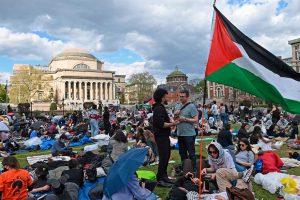
CHICAGO (AP) — Chicago Mayor Brandon Johnson began his first term of office Monday, asking Chicagoans to set aside deep differences, confront challenges together and build “a city that works for everyone.”
Johnson, 47, whose victory was touted by progressives as evidence that bold stances lead to victory, must immediately confront an influx of migrants in desperate need of shelter, pressure to build support among skeptical business leaders, and summer months that historically bring a spike in violent crime. His first term leading the nation’s third-largest city will test the former union organizer’s ability to turn his proposals into solutions for stubborn problems worsened by the coronavirus pandemic, including public safety, economic growth and housing affordability.
Advertisement
“Let’s show the world, Chicago, where our heart is,” Johnson said in his inaugural address before a cheering crowd. “Let’s build a Chicago that is the economic marvel of our the state, the Midwest and this nation. Let’s build a Chicago that means our economy gets to grow by rerouting the rivers of prosperity to the base of disinvestment. So that no one goes thirsty.”
The former organizer for the Chicago Teachers Union was little known when he entered the mayoral race in 2022 and has no experience within city government. But the two-term Cook County commissioner gradually climbed atop a crowded field with the support of the influential union he once worked for, endorsements from Sens. Bernie Sanders and Elizabeth Warren and local progressives to knock off the incumbent mayor, Lori Lightfoot, and win a tough runoff in April.
Trying to appeal to those who didn’t back him in the election, he has stocked his transition team with familiar names from Chicago corporations and philanthropies beside leaders of organized labor and progressive groups. He selected a veteran of Chicago’s emergency management agency as his chief of staff and a retired police commander who is popular among rank-and-file officers as interim leader of the Chicago Police Department.
There is little doubt that public safety will remain the city’s top concern and Johnson’s response will shape his relationship with business leaders, elected officials, his progressive activist base and residents of every Chicago neighborhood.
Advertisement
“A safe Chicago means a safe Chicago for all, no matter what you look like, who you love, or where you live,” Johnson said Monday, promising a strategy rooted in more mental health care, violence prevention programs and police accountability.
Jacek Boczarski/Anadolu Agency via Getty Images
Asiaha Butler, co-founder of the Resident Association of Greater Englewood on the South Side, said she hopes Johnson stays committed to his wholesale approach to crime — and that Chicagoans give it an opportunity to make a difference. Butler said improving safety on her block took up to 15 years of cooperation with neighbors and other community groups.
“Knowing the despair that our city sometimes faces, it will take a while to take that cloud away,” Butler said. “I wouldn’t put anyone up to that job in one term.”
Chicago has a higher per-capita homicide rate than New York or Los Angeles, but the most recent federal data shows it’s lower than other Midwestern cities, such as St. Louis and Detroit. Still, the number of homicides in Chicago hit a 25-year high in 2021 with 804, according to the Chicago Police Department.
Advertisement
That number decreased last year while other crimes, such as carjackings and robberies, increased.
Chicago business leaders overwhelmingly endorsed Johnson’s opponent, former Chicago schools CEO Paul Vallas, typically swayed by his pitch to strengthen policing, or Johnson’s various tax proposals affecting large companies and the wealthy.
The mayoral race was dominated by questions of how to address crime, and Johnson argued that a policing-first approach has failed.
Instead, he proposed increased mental health treatment, hiring more detectives, expanding youth jobs programs and increasing taxes on the sale of properties over $1 million to support more affordable housing. Johnson will also have the final say on naming the city’s next police superintendent, though for the first time an appointed citizen commission will select three finalists.
Andrea Sáenz, president and CEO of the Chicago Community Trust foundation, said she’s hopeful that Johnson can bring philanthropies, businesses, police and activists together to create a wide-ranging strategy to prevent violence now and chip away at the conditions that let it flourish.
“It feels like this is a moment — the moment — to have those conversations, for a mayor to bring everybody to the table,” Sáenz said.
Advertisement
Johnson has shown no sign of backing away from his campaign strategies. When violence broke out as teens flooded Chicago’s downtown streets in mid-April, he issued a statement asking that people not “demonize youth who have otherwise been starved of opportunities in their own communities.”
Paying for his campaign promises, including the public safety response, hinges on a number of tax increases aimed at high earners and large companies likely to put up a political fight. Illinois Gov. J.B. Pritzker, the state’s most influential Democrat, declined to back Johnson’s proposal to tax financial transactions, which would require sign-off from state lawmakers.
Johnson is also taking on a growing migrant crisis. Chicago is among the U.S. cities already struggling to provide shelter and other help to hundreds arriving from the southern border, with families sleeping in police station lobbies. The flow of arrivals is expected to increase now that pandemic-era restrictions on migrant crossings have ended.
Johnson said Monday that he is committed to welcoming all who arrive here, saying the strength of a city depends on how it treats the vulnerable. He provided no new details about his administration’s strategy.
Illinois state Rep. Kam Buckner, a Chicago Democrat who also ran for mayor, said Johnson will have to use the same strategy that won him the mayor’s office to achieve his many priorities.
Advertisement
“What Lori Lightfoot learned is that in Chicago, your defenders can very quickly become your detractors,” Buckner said. “We want our leaders to be authentic, have conversations with us about the future. As long as he continues to do that, I think people will give him an opportunity.”


